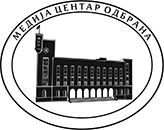28.12.2016
Book ‘Geopolitics – ideas, theories, concepts' promoted
 In the atrium of the Central Military Club, the latest publishing project of the Institute for Political Studies was published – an extensive, original and in all capital work ‘Geopolitics – ideas, theories, concepts’ by Professor Milomir Stepić, which, for the first time in our country, laid the scientific foundations of geopolitics, an interdisciplinary science that does not stop searching for its place under the sun. The book was presented by Prof. Časlav Ocić, full member of Serbian Academy of Sciences and Arts, Prof. Radovan Radinović, Lieutenant General retired, Momcilo Subotic, PhD, Research Fellow at the Institute for Policy Studies and the author.
In the atrium of the Central Military Club, the latest publishing project of the Institute for Political Studies was published – an extensive, original and in all capital work ‘Geopolitics – ideas, theories, concepts’ by Professor Milomir Stepić, which, for the first time in our country, laid the scientific foundations of geopolitics, an interdisciplinary science that does not stop searching for its place under the sun. The book was presented by Prof. Časlav Ocić, full member of Serbian Academy of Sciences and Arts, Prof. Radovan Radinović, Lieutenant General retired, Momcilo Subotic, PhD, Research Fellow at the Institute for Policy Studies and the author.At a time, different from anything we are used to, where a man remained confused and passivated because of tremendously accelerated events and science drawing back before voluntarism, Stepic’s book, Časlav Ocić, PhD, said, is a roadmap for effective, meaningful and thorough activation.
- Answer to the question why things happen and how to adapt to developments is not enough any more, but it is necessary to find out what will our activities serve for, where would certain decision lead. This does not mean foretelling the future, but listening to characters, informed assessment of possible consequences, Časlav Ocić, PhD, said, while Radovan Radinović said that Milomir Stepić, who is also a scientific advisor at the Institute for Political Studies, formed in his monograph an authentic notional-categorical apparatus of geopolitics as a science, established clear subject of its study, gave original division and research methodology and determined its place in the system of sciences. Radinović then stressed all the values of the book which, according to him, represents a turning point in the development of geopolitics, but also provides guidance to practitioners in strategic stepping through time and events.

- That capital work has 700 pages, contains more than 800 footnotes which indicate the high level of scientific credibility, 450 bibliographic and documentation units, 25 photos, six schemes and 56 maps, which greatly refreshes the theoretical contents of the book. At the same time, that work, with its original and comprehensive approach, provides a valuable roadmap for geopolitical practitioners in making strategic decisions.
Momčilo Subotić, PhD, inter alia, stressed special importance that is given in the book to relation between the geopolitics and geographical science from which it originated, political science, with which geo-strategy, where it is directly applied, have unbreakable ties. The main part of the book is a plunge into history of the ideas of the interdependence of geographic and political analysis of geopolitical concepts from the turn of the nineteenth century into the twentieth to the present, including their projection on the Balkan and Serbian areas.

